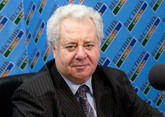Recently, the first issue of the RSUH Herald’s periodical entitled ”The Eurasian Studies. History. Political Science. International Relations" was published. Yefim Pivovar, the historian, corresponding member of the Russian Academy of Sciences, president of the Russian State University for the Humanities, member of the board of the Russian Historical Society, told Vestnik Kavkaza about the scientific periodical focusing on the problems of the Eurasian space and Greater Eurasia.
- Who is involved in the creation of the Eurasian Studies?
- A lot of publications have materials on this topic, specialized magazines focused only on this topic are also appearing. The Eurasian Studies: History, Cultural Studies, and International Relations is among such publications. This is the result of a hard tedious work carried out by the structure that I am privileged to head - the Institute of Post-Soviet Interregional Studies. We have a post-Soviet foreign department, department for humanitarian cooperation with the CIS countries. The decision was made by the CIS Executive Committee, and employees of our institute as well as related structures, for example, Confucius Institute at Russian State Humanitarian University that carries out studies on problems of China and neighboring countries, including the Russian Federation, Mongolia, the countries of the Central Asian region, and the South Caucasus are trying to implement it along with the Faculty of History of Political Science and Law that also studies modern China and Iran, the Caspian region - all of Eurasia - and our Turkish center, where the future bachelors in international relations are studying the history and culture of Turkey and neighboring countries, the Black Sea and Caspian basins.
- What materials are included in the first issue?
- The subject is very diverse, it covers the Caspian region, countries of Central Asia, problems of compatriots abroad and soft power in the post-Soviet space, the problems associated with a number of works that have been published in our country and abroad on this topic, scientific life. We also touched upon the Eurasian Readings that were held at our University with the participation of our students. There is a work related to the post-Soviet and inter-regional research as well as the expert, scientific, teaching and educational materials.
- Who are your authors?
- First of all, we want to publish works of teachers, professors and candidates of sciences, associate professors of our institute, as well as representatives of other RSUH structures, masters and bachelors. From the very beginning, students participate in the work as beginner experts. It is important for them to continue their studies and complete them in the course of master’s degree programs. We will try to publish the works of our masters. Master's works on the post-Soviet space can become articles. In the second issue of our publication, there will be such works too. We also rely on foreign authors. In the first issue, our Kazakh partners published very interesting material. We rely on authors from far abroad, because both in the editorial board and in our partner organizations cooperating with us, there are Turkish and French researchers. I think it will become a very interesting platform.
I must say, there are few such publications. There are enough sources, but not enough specialized magazines. Recently, a similar publication of the Diplomatic Academy of the Ministry of Foreign Affairs appeared, but the Russian State University for the Humanities is one of the pioneers in this regard. Therefore, the decision of the RSUH leadership to create such a publication is extremely important, urgent and very timely.










